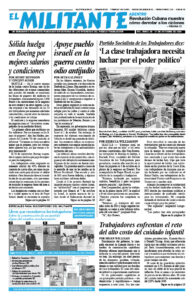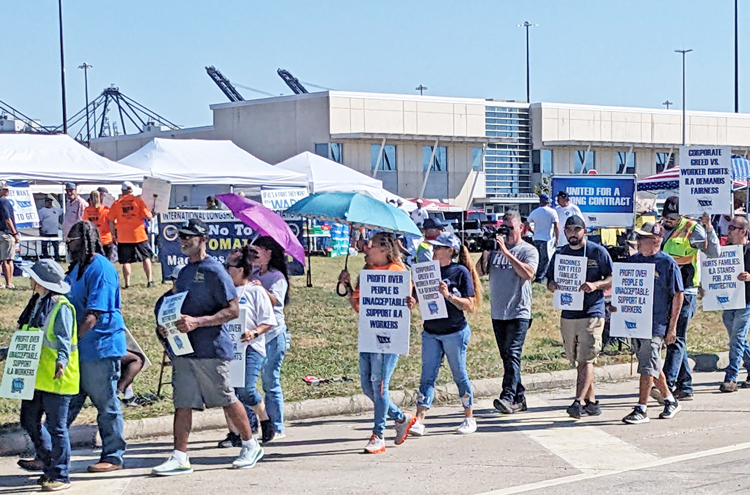Large picket lines set up by thousands of striking dockworkers solidly shut down East and Gulf coast ports for three days, showing the power of organized labor in action. The United States Maritime Alliance, representing bosses at shipping lines and terminal operations, was forced to significantly increase its wage offer to the 45,000 members of the International Longshoremen’s Association Oct. 3.
Strikers had pointed out the bosses had been lining their pockets with billions in profits while the union members worked during the pandemic, and soaring prices made their paychecks worth less and less.
The union accepted the 62% wage raise over six years and agreed to have members return to work, extending the current contract until a new strike deadline of Jan. 15. During that time, negotiations will continue on other key issues, most notably the drive of the bosses for increased use of automation to cut jobs and speed up work on the docks, threatening workers’ safety.
Dockworkers face haphazard schedules, shifts that stretch for 15- or 20-plus hours when ships are in port, loading and unloading thousands of containers, and no work or pay when there are no ships. These wreak havoc with workers’ family lives, as well as time for political and union activity.
And workers on the docks are saddled with a divisive multitiered system of jobs and pay that makes life far harder for newer workers.
Winning a substantial wage increase was a central demand of the union. Inflation cut down the buying power of dockworkers’ paychecks by 20% since the last contract was signed in 2018. This victory over wages bodes well for their fight over the other issues.
Kenneth Riley, an ILA vice president based in Charleston, South Carolina, told the Washington Post the wage increase over six years was the largest wage gain the union has ever won before.
He also said they were ready to shut the docks down again if needed. “We’re not playing around. If we say we’re going out, we’re going out.”
The question posed by the bosses’ drive to step up automation, the issue that brought negotiations to a halt before the strike, remains unresolved. The bosses look to far-reaching use of driverless trucks, automated cranes and computerized gate checkpoints to speed up work and boost profits. The question isn’t the use of technology, but the protection of jobs, paychecks and safety. The union will now take on negotiations over whether and how new technology is deployed and how to defend the workers.
Slander campaign against the union
Business interests, the boss press and their allies lined up to attack the ILA, slandering the union as a Mafia puppet, even claiming the union was selfishly interfering with aid reaching working people hit hard by Hurricane Helene.
President Joseph Biden, with an eye to the fast-approaching elections, said his administration wouldn’t interfere in the strike, while pressing for an agreement.
“At my direction, the Florida National Guard and the Florida State Guard will be deployed to critical ports affected by the strike to maintain order, and where possible, resume operations,” Florida Gov. Ron DeSantis declared before the strike ended, vowing to respond swiftly to “any disruptions.”
The New York Sun applauded DeSantis’ assault on the dockworkers: “Mr. DeSantis’s stand calls to mind the mettle shown by the 10 governors who, in 1877, sent in troops to reopen the railroads amid a destructive strike.” They were talking about the great rail strike, the first nationwide labor upheaval in the U.S., a watershed in the development of the labor movement.
The Wall Street Journal had to acknowledge that when the Justice Department brought civil and criminal charges against (ILA President Harold) Daggett in 2005, claiming he was conspiring with mob bosses, “he won both cases.” Still, they proclaimed, “The ILA’s port stranglehold is a racket.”
The bosses have used such slanders over decades to attack the longshore and other unions. To carry this out, they promoted the creation of the New York-New Jersey Waterfront Commission, which worked with the FBI to police the docks and all hiring. In a 2018 report, the commission claimed nearly one in five applicants seeking jobs on the docks were denied because of supposed mob connections.
What did that mean? “Job applicants with an Italian-sounding name, they were automatically suspect,” John Nardi, president of the New York Shipping Association, had to admit. “Is there still organized crime at the port? If there is, I haven’t seen it personally.”
The commission was finally crippled this year when the state government in New Jersey, where most dock work in the metropolitan area is now done, pulled out, saying they’d rely on the State Police going forward.
This union battle on the docks is far from over. “The longshoremen’s fight for a fair contract is the entire labor movement’s fight,” AFL-CIO President Liz Shuler wrote Oct. 3. “The AFL-CIO and our nearly 13 million members from 60 unions are proud to stand in strong solidarity with them.”
For the millions of working people who glimpsed the potential power of our unions from the dockworkers’ spirited mass picket lines, solidarity with the International Longshoremen’s Association remains crucial.


